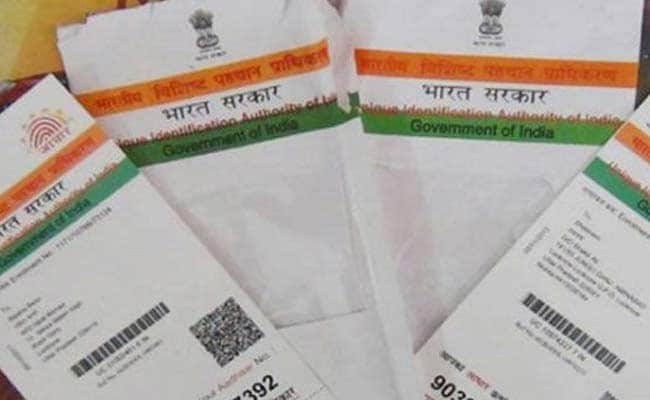
Aadhaar-issuing authority UIDAI declined to share info on fake Aadhaar cards, citing national security
New Delhi:
The UIDAI has refused to share information on cases of fake and duplicate Aadhaar cards, saying the disclosure might affect national security, or can lead to incitement of an offence.
Replying to an RTI query by a Press Trust of India correspondent, the Unique Identification Authority of India (UIDAI), which issues the card, also denied to give details of action it has taken in such cases.
It said, the UIDAI's Central Identities Data Repository (CIDR) facilities, information assets, logistics and infrastructure and dependencies, have been classified as 'Protected System', under the Section 70(1) of the Information Technology Act, 2000.
"Any disclosure of the UIDAI grievance database, which essentially forms a part of the UIDAI CIDR operations, therefore, would have an impact on national security, strategic, scientific and economic interest of the State etc.," the UIDAI said in response to the RTI application.
It was asked to provide details related to the cases of duplicate and fake Aadhaar cards received by the UIDAI, and action taken on them.
The information sought would fall under Section 8(a) of the RTI Act, and therefore, it is denied, the UIDAI said.
The section bars information "disclosure of which would prejudicially affect the sovereignty and integrity of India, the security, strategic, scientific or economic interests of the State, relation with foreign State or lead to incitement of an offence".
Further, the format in which information is held by the UIDAI, contains identity details which, if divulged, maybe prone to identity-theft etc, the authority said.
The Aadhaar card carries 12-digit unique identification number. The card acts as a proof of identity and address.
There have been a few complaints against certain unauthorised websites for promising Aadhaar-related services.
At least eight FIRs have been filed by police against as many unauthorised websites for promising such services.
Replying to an RTI query by a Press Trust of India correspondent, the Unique Identification Authority of India (UIDAI), which issues the card, also denied to give details of action it has taken in such cases.
It said, the UIDAI's Central Identities Data Repository (CIDR) facilities, information assets, logistics and infrastructure and dependencies, have been classified as 'Protected System', under the Section 70(1) of the Information Technology Act, 2000.
"Any disclosure of the UIDAI grievance database, which essentially forms a part of the UIDAI CIDR operations, therefore, would have an impact on national security, strategic, scientific and economic interest of the State etc.," the UIDAI said in response to the RTI application.
It was asked to provide details related to the cases of duplicate and fake Aadhaar cards received by the UIDAI, and action taken on them.
The information sought would fall under Section 8(a) of the RTI Act, and therefore, it is denied, the UIDAI said.
The section bars information "disclosure of which would prejudicially affect the sovereignty and integrity of India, the security, strategic, scientific or economic interests of the State, relation with foreign State or lead to incitement of an offence".
Further, the format in which information is held by the UIDAI, contains identity details which, if divulged, maybe prone to identity-theft etc, the authority said.
The Aadhaar card carries 12-digit unique identification number. The card acts as a proof of identity and address.
There have been a few complaints against certain unauthorised websites for promising Aadhaar-related services.
At least eight FIRs have been filed by police against as many unauthorised websites for promising such services.
Track Latest News Live on NDTV.com and get news updates from India and around the world

